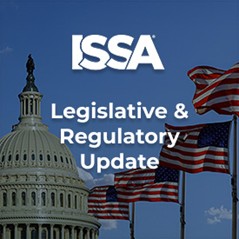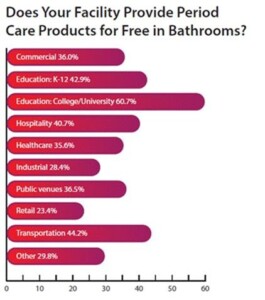ISSA Leg. & Reg. Update – State Pesticide Registration Survey Now Available
 Welcome to the latest ISSA Legislative & Regulatory Update, a biweekly roundup of the public-policy issues currently impacting the full cleaning supply chain. This update touches on ISSA’s 2025 State Pesticide Registration Survey, ISSA opposing the Warehouse Worker Protection Act, what a recent ISSA-commissioned survey reveals about menstrual care in facilities, and more.
Welcome to the latest ISSA Legislative & Regulatory Update, a biweekly roundup of the public-policy issues currently impacting the full cleaning supply chain. This update touches on ISSA’s 2025 State Pesticide Registration Survey, ISSA opposing the Warehouse Worker Protection Act, what a recent ISSA-commissioned survey reveals about menstrual care in facilities, and more.
Want to stay informed about critical government affairs impacting the cleaning and facility-solutions industry? Sign up here to have the ISSA Legislative & Regulatory Update emailed directly to you every other week.
ISSA Advocacy
Now Available — 2025 ISSA State Pesticide Registration Survey
What it means: ISSA’s 2025 State Pesticide Registration Survey is now available to ISSA members. This valuable resource provides essential information on pesticide registration requirements for each U.S. state, as well as for Washington, DC; Puerto Rico; the Virgin Islands; and Guam.
Why it matters: Pesticide registration is a crucial component of the cleaning industry, as many cleaning products fall under this regulatory category. Understanding the specific requirements of each state is essential for ensuring compliance and avoiding costly penalties.
What ISSA is doing: Since our 2024 update, the pesticide registration fees for California, Maine, Nevada, New Hampshire, Ohio, Vermont, and Puerto Rico have all increased, and we anticipate the fees increasing soon in Delaware and New Mexico. Registration authority references also have been updated throughout the 2025 survey. Access the survey now
ISSA Opposes Warehouse Worker Protection Act
What it means: ISSA, along with 44 other organizations, sent a letter to members of the U.S. House of Representatives and Senate strongly opposing the Warehouse Worker Protection Act (S 2613/HR 4896), which would “impose long-discarded and unworkable regulations on warehouse distribution centers, curtail employers’ due process rights when challenging citations from the U.S. Occupational Safety and Health Administration, and hamstring a critical part of our national supply chain,” according to the letter.
Why it matters: Despite its narrow sounding title, the legislation would impact workplaces in nearly every industry sector nationwide, including the cleaning industry. Protecting workers is a priority for all employers, but this bill would “impede efficient operations without improving workplace safety.”
What ISSA is doing: The Warehouse Worker Protection Act is opposed by a wide variety of employers and industries, including ISSA, demonstrating the breadth of the bill’s impact and the serious negative consequences that it would have on the economy. The association will continue to track this legislation and keep our members apprised, accordingly. Read the letter now

This data is from an independent survey conducted by All In One Insights, which ISSA recently commissioned to examine menstrual care in facilities. |
Inside the Data — What the Numbers Say about Menstrual Care in Facilities
What it means: In 2022, ISSA launched its End Period Poverty educational and advocacy campaign to support efforts to increase access to period products and disposal solutions. The reason behind the campaign is the fervent belief that menstrual-care solutions should be as available in away-from-home bathrooms as soap, toilet paper, and paper towels. Continuing these efforts, ISSA commissioned an independent survey across a broad cross-section of facility types and industries to determine the current availability of period-care products (PCPs), identify barriers to wider access, and explore factors that might motivate more facilities to provide these essential hygiene products.
Why it matters: A few key themes emerged from the survey results: 1) Awareness is a major obstacle. Many decision-makers simply haven’t considered the need to provide PCPs; 2) Demand—whether from customers, employees, or regulatory bodies—clearly drives action; and 3) The educational sector presents a compelling model for implementation. With their strong adoption rates and comprehensive disposal systems, schools and universities demonstrate how institutional support can normalize access to period care and remove stigma.
What ISSA is doing: In partnership with researchers like All In One Insights, ISSA is proud to continue advancing this critical conversation and supporting those who are ready to take action. Read the full article by ISSA Government Affairs Director John Nothdurft in the latest issue of ISSA Today: Access the article now
Additional Updates
Judicial
Supreme Court Takes up Expedited Appeal of Trump Tariffs
The U.S. Supreme Court agreed to hear arguments over President Trump’s sweeping global tariffs, taking up a fast-moving appeal that deals with the centerpiece of the administration’s economic agenda. In the meantime, the tariffs remain in place while the court hears the case. The Supreme Court said that it would hear arguments in the case during the first week of November. A decision would normally be expected by the end of June. But in this case, the court said that it would expedite its review. Learn more (CNN)
Supreme Court Lifts Restrictions on ‘Roving’ ICE Raids in LA
The U.S. Supreme Court lifted restrictions that barred the Trump administration from carrying out immigration-related raids in the Los Angeles area based on broad criteria such as speaking Spanish or gathering at locations where day laborers often congregate. The justices, who divided 6-3 on the case, put on hold a federal district judge’s order that reined in what critics called “roving” raids by U.S. Immigration and Customs Enforcement. Learn more (Politico)
Legislative
Senate Rejects Both Parties’ Bills to Avoid Shutdown
The U.S. Senate voted to block dueling Republican and Democratic proposals to keep the federal government funded on a short-term basis. The failures underscore the divide between the two parties and leave Congress with no clear path forward to avoid a government shutdown that is set to begin on October 1. Learn more (NBC News)
IAQ Bill Would Establish Nationwide Assessments in Schools
Representatives Paul Tonko (D-NY-20) and Brian Fitzpatrick (R-PA-8) reintroduced the Indoor Air Quality and Healthy Schools Act, which would require a nationwide assessment of indoor air quality in schools and childcare facilities, as well as expand the role of the U.S. Environmental Protection Agency. ISSA continues to monitor this issue. Learn more (Cleaning & Maintenance Management)
House Votes to Extend President’s Tariff Authority through March
A measure that effectively blocks challenges to President Trump’s global tariff declarations through March 2026 was adopted by the U.S. House of Representatives on a 213-211 vote. Learn more (Politico)
Defense Bill Could Loosen Restrictions on Pentagon’s Use of PFAS
Provisions in the U.S. House of Representatives and Senate annual Defense authorization bills reduce restrictions on the Pentagon’s use of per- and polyfluoroalkyl substances (PFAS) or “forever chemicals.” In the House, one such provision is generating pushback even from Republicans. Learn more (The Hill)
Regulatory
USTR Seeks Public Comment on USMCA
The Office of the U.S. Trade Representative (USTR) announced a public consultation process in advance of the joint review of the agreement between the United States, Mexico, and Canada (USMCA) on July 1, 2026. As directed by Congress, USTR is seeking public comments now through November 3, 2025, on the operation of USMCA. Additionally, USTR will hold a public hearing on November 17. The review will culminate in reports to Congress evaluating the deal’s effectiveness and outlining possible changes or the U.S. position on extending the agreement. This consultation process is required by law. Learn more (Office of the USTR)
Government RFP Process — A Guide for Cleaning-Industry Vendors
Navigating the government RFP process can be intimidating, especially if you’re a small to mid-size cleaning or facility management company new to public contracts. But landing a government contract can significantly boost your revenue and reputation. This article explains the stages of the government RFP process in plain terms, with insights tailored to the cleaning industry. Whether you’re bidding on municipal janitorial services or a federal sanitation contract, this guide will help you prepare more confidently and more competitively. Learn more (ISSA)
State & Local News
States Weigh Options as Feds Revisit PFAS Rules
With the U.S. Environmental Protection Agency planning to rescind national standards for per- and polyfluoroalkyl substances (PFAS) or “forever chemicals” in drinking water, the National Conference of State Legislatures (NCSL) and the states call on the feds to fund cleanup and remediation. Learn more (NCSL)
New Law Strengthens NY’s Ability to Intervene in Labor Disputes
New York State’s labor board will have wider powers to intervene in labor disputes because of a new bill signed into law by Governor Kathy Hochul. The law allows the state’s Public Employment Relations Board to intervene in private sector labor disputes if the U.S. National Labor Relations Board is unable to act, as has been the case for most of 2025. Learn more (WAER)
MN Readies to Launch Comprehensive Paid-Leave Program
Minnesota’s paid-leave program launches in January, providing partial wage replacement and job security for workers to care for loved ones or their own medical needs. It’s one of the most comprehensive paid-leave laws in the country and has required the state to build a sprawling administrative apparatus. Learn more (Governing)
ME’s Minimum Wage Will Increase Next Year
Maine’s minimum wage will increase to US$15.10 per hour next year. Currently, the state’s minimum wage is $14.65, but the Maine Department of Labor announced a 45-cent increase that will take effect January 1, 2026. The “tip wage,” or the minimum wage for service employees, will increase to $7.55 per hour. Learn more (Maine Morning Star)
San Diego City Council Approves Minimum Wage Hike for Hospitality Workers
The San Diego City Council agreed to raise the minimum wage for some hospitality workers in the city to US$25 an hour, phased in over several years. Learn more (ABC 10 News)














